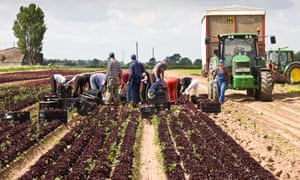Futures Forum: Brexit: and migrant workers in Devon
Or, as far back as 2007, as reported originally in the Express: The gangmasters call their company Paradise Solutions Ltd but as migrants shuffle in on payday it's hard to see why:
Paradise for 5.57 an hour, West Coast News, Devon, Cornwall, Somerset, The Heart Of The Story
There are certainly many migrant workers in the South West employed in its carehomes and hotels:
Futures Forum: Brexit: and migrant workers in care homes and hotels >>> Who will take care of us "when the immigrants leave?"
Futures Forum: Brexit: and cheap labour for the hospitality and care industries
Futures Forum: Brexit: and caring for the elderly
And apparently there are not enough 'indigenous' workers in the South West to fill these positions:
Futures Forum: Brexit: and low-skilled migrant workers: "There are parts of the country where unemployment is really, really low [such as Exeter]. Many of the young unemployed people are on the other side of the country and they are not going to come down to Exeter, and they don't."
It is more complicated, of course.
Firstly, 'non-indigenous' workers are actually not finding it so attractive these days:
Futures Forum: Brexit: and migrant workers not wanting to work on West Country farms
Secondly, there is clearly a demand for better employment opportunities other than the back-grinding work of the fieldworker and chambermaid:
Futures Forum: Brexit: and providing good quality jobs
And, thirdly, it seems that keeping out migrant labour will not necessarily stimulate either pay or quality in the job market:
Migration cut will raise low pay by just 1% | News | The Times & The Sunday Times
Press Release: Sharp fall in migration post Brexit could shrink GDP per capita by more than 3pc | National Institute of Economic and Social Research
Major cut in EU migrants risks long-term damage to UK economy – report
NIESR thinktank says hard Brexit would reduce annual GDP per head while giving only a ‘modest boost’ to wages of low paid
 Foreign workers harvesting lettuce in the Lincolnshire Fens. Photograph: Tim Scrivener/Rex/Shutterstock
Foreign workers harvesting lettuce in the Lincolnshire Fens. Photograph: Tim Scrivener/Rex/ShutterstockAlan Travis Home affairs editor
Wednesday 7 December 2016 14.14 GMT
A major cut in immigration from the European Union to Britain after Brexit would produce a damaging long-term hit to future economic growth while yielding only a “modest boost” of under 1% to the wages of low-paid workers, new research has found.
The study by the National Institute of Economic and Social Research (NIESR) thinktank says a “middle range” Brexit where EU immigration falls by as much as 91,000 a year would cut the growth of gross domestic product per head by 3.4% lower than it would otherwise have been by 2030.
But in the more extreme scenario of a hard Brexit where EU immigration was cut by 150,000 a year – which may be needed to hit Theresa May’s 100,000 a year net migration target – the economists say this would hit annual GDP per head by 5.4%.
While the economy was taking such a long-term damaging hit the NIESR economists say the effect on wages of those in low-skilled jobs in the most directly affected industries such as construction, retail, hospitality and food processing would be, if at all, relatively modest.
The study’s “middle range” scenario says the pay of those in such low-skilled jobs would rise by up to 0.51% by 2030 while in the hard Brexit scenario they would increase by 0.82% a year.
 Amber Rudd says EU nationals in post-Brexit UK will need 'form of ID'
Amber Rudd says EU nationals in post-Brexit UK will need 'form of ID'Jonathan Portes, NIESR research fellow and one of the report’s authors, said: “Prior to the referendum, a number of analyses estimated the long-term impacts of Brexit on the UK economy; but none incorporated the impacts of Brexit-induced reductions in migration. Our estimates suggest that the negative impacts on per capita GDP will be significant, potentially approaching those resulting from reduced trade.”
He said the 3.4% hit to per capita GDP from a 91,000 reduction in EU migration in the NIESR’s central scenario was on a similar scale to the impact from the falls in trade and investment projected by the Treasury, the Organisation for Economic Co-operation and Development (OECD) and the International Monetary Fund (IMF) before the Brexit referendum.
The analysis by Portes and his co-author, Giuseppe Forte, shows that the economic damage of deep cuts in EU migration go even beyond the estimate made by the Office of Budget Responsibility (OBR) at the chancellor’s autumn statement last month.
The OBR, in the absence of a new government policy on immigration, based its assumptions on a conservative 80,000 a year reduction in net migration to Britain. It estimated that this cut would cost the economy £0.8bn in 2016-17 rising to £5.9bn a year by 2000-21 and with a total hit of £16bn over the next five years.
The NIESR estimate suggests a similar fall in EU immigration will prove even more damaging to the British economy. This is because, unlike the OBR model, it includes an assumption that the fall in net migration will also cut the growth in labour productivity in Britain by reducing the competition for work.
The authors say their analysis uses a methodology similar to that employed by mainstream economic forecasters to model the impact of Brexit-induced reductions in trade on productivity and growth.
“The broad scenario (not forecasts) we depict imply that the negative impacts on per capita GDP will be significant, potentially approaching those resulting from reduced trade. By contrast, the increase in low-skilled wages, resulting from reduced migration is expected to be, if at all, relatively modest,” they conclude.
The shadow home secretary, Diane Abbott, said she welcomed the report as it was being published at a time when evidence-based analysis on immigration and its effects was becoming a rarity: “The report requires further scrutiny, but in broad terms it clearly shows that economic growth would be hit substantially by sharp cuts in immigration, while any boost to wages is likely to be minimal and confined to some of the very lowest-paid sectors.
“Labour will offer a fair immigration policy, which benefits the whole economy and maximises prosperity for all. The government should abandon its unachievable and damaging net migration targets.”
Major cut in EU migrants risks long-term damage to UK economy – report | UK news | The Guardian
.
.
.

No comments:
Post a Comment